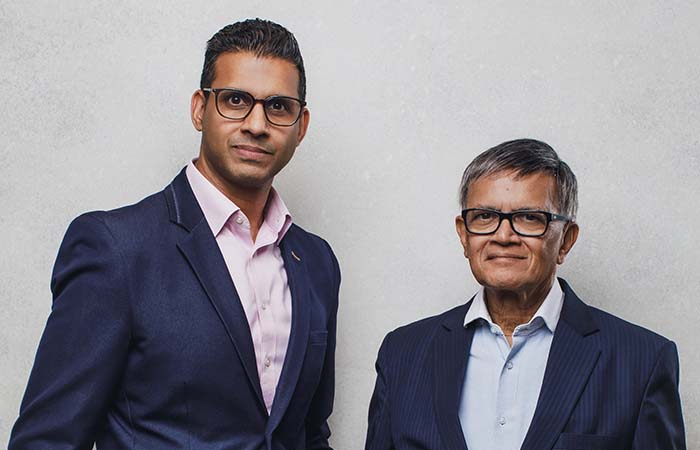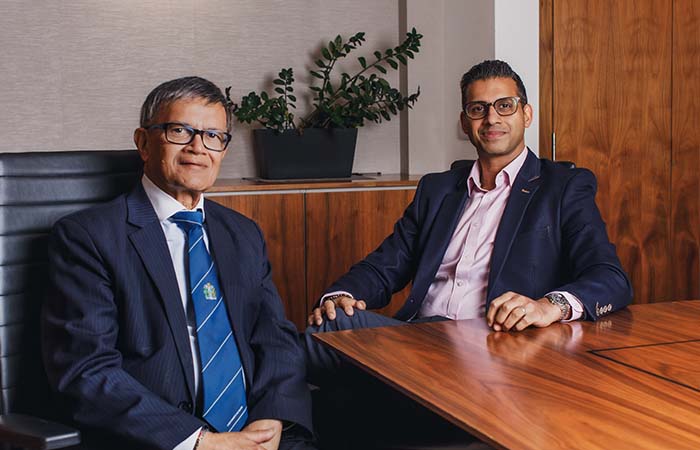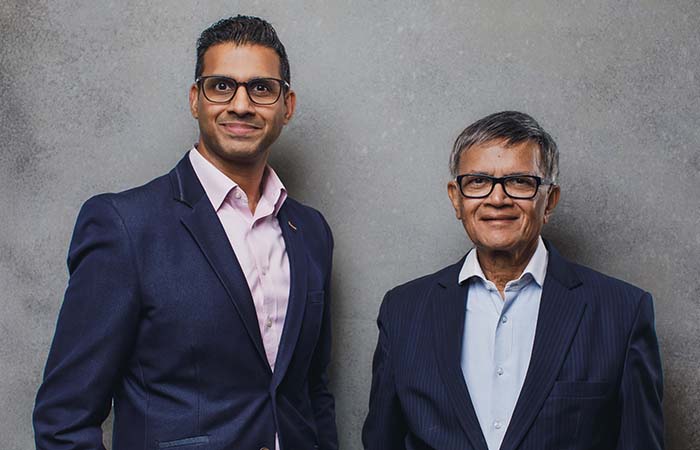Generational change at Sigma Pharmaceuticals
In Interviews
Follow this topic
Bookmark
Record learning outcomes

Bharat and Hatul Shah of Sigma Pharmaceuticals on the challenges and payoffs in handling a generational transition. By Arthur Walsh
On the edge of a business park in Watford, just around the corner from the Majestic Wine headquarters. lies a family business that has operated from the town for over 40 years – growing from a pharmacy to a distribution warehouse and now a well-established short-line pharmaceutical wholesaler serving the independent pharmacy sector.
The family aspect has always been key, says ‘semi-retired’ founder Bharat Shah, who started Sigma Pharmaceuticals with his brothers Manish and Kamal in the early 1980s after opening his first pharmacy in Watford in the late 1970s.
“We had to put our thinking hats on” to find the right way of combining their professional capabilities, he says (Manish is a chartered accountant and Kamal a logistics professional). They hit on a problem that many pharmacies were dealing with: sourcing generic drugs. “I bounced an idea: why don’t we go into generics distribution?”
One of the first tasks was finding customers, which saw Bharat tapping his extensive network of pharmacist friends. About 30 “signed up on day one” , and word of mouth soon spread. “We started from a turnover of zero but within two years we were at almost two million, which in those days was quite substantial,” he says.
Operations started in “a shed” in 1982 before moving onto the current site in 1985. “The volumes just kept on increasing and more customers started coming in,” says Bharat, for whom word of mouth was a “powerful medium”.
The biggest breakthrough in those early years came in 1985 when the government published a ‘blacklist’ of drugs for which pharmacies would not be reimbursed, in an attempt to move doctors away from the then-widespread practice of prescribing branded versions of staple drugs like paracetamol.
“Within about three or four months, the doctors got so fed up with pharmacies calling them that they wrote everything generically - our volumes went through the roof,” remembers Bharat. New competitors in generics distribution sprang up too.
The next boom began in the early 1990s ‘patent cliff’ when many ‘blockbuster’ medicines came off patent. “Volumes shot up – every two months a product was coming off brand and into generics as the patents expired.”
“If you look at our accounts from 1990, we were just going one way,” he recalls with one hand gesturing towards the ceiling. Around the time of the millennium, they hit the £200m milestone, rising to £271m in their most recent Companies House filing.
Not that there have been no bumps in the road since Bharat and his brothers first set up shop. He says Brexit delivered a crunch moment as at least 20 per cent of turnover was wiped out overnight. “We could import from Europe but not export”. It took some time for the business to recover from that shock,” he recalls.
Handover
The business has continued to grow since those early days, and as it has evolved it has seen younger members of the Shah family rise through the ranks. This is a dynamic that will be familiar to many pharmacy owners.
Speaking alongside Bharat is son Hatul, a pharmacist like his father (as well as being an MBA holder) and until recently the holder of the chief executive position at Sigma. He first joined the family business in 2015 after practising for over a decade, working first in Boots branches before buying a small group of independents with industry friends.
Recruitment decisions must always be carefully made, but from talking with the pair I quickly get the sense that transferring the running of a company from one family generation to the next must be an especially delicate business.
Bharat says the next generation of Shahs joined the business on “very mundane” roles initially, as it “wouldn’t have been fair” to immediately appoint them as managers. But by 2019, the younger Shahs – who as well as Hatul included his brother Rajiv and cousins Bhavin and Paras – were on the board of executives.
He reminisces: “The only way to do it was for me and my brothers, who were all over 65, to take a step back. A very difficult decision, but on the other hand the next generation made it quite easy; they modernised it with their ideas.”
But there were a few teething problems in onboarding the new executives, and so consultants were brought in to help steer the business and appoint the younger Shahs to their roles. Hatul became CEO in 2019 – right in time for a round of refinancing and shortly before the onset of the Covid-19 pandemic, when “all hell broke loose”.
It was a baptism of fire, recalls the younger Shah, and a time when the company pulled out all the stops to serve its customer base of independent contractors. It also exposed some cracks in the system: “I’ll be quite open to say this, we hadn’t invested in technology, we hadn’t invested in looking at how we can work as a business through agile means. We weren’t the only business in that situation, tens of thousands of businesses had a difficult pandemic,” he says.
“Our operations were so busy without having the right systems and processes in place. We weren’t using our customer and stock data. We then started looking at all of that and you could just see how we were eroding costs.”
Difficult conversations had to be had with some historic customers, too. “That was based on the fathers’ generosity in the industry; they were giving very generous terms to customers. In those days, it was fine to do that because customers wanted to start their own businesses, so they didn’t need to work in capital.”
Moving away from this was “quite difficult” for the older generation but had to be done to keep the bank on side, says Hatul. “Businesses were being shut down left, right and centre at that time.”
Did Sigma lose customers as a result of revisiting these terms? “I wouldn’t say so. Maybe a few left, but we also gained some. All it meant was we just tightened up our processes and structures.”
He says that while they have to pay their suppliers within 30 days, some customers were told “pay when you can”. He goes on: “That’s what Sigma was. It was built on trust, on loyalty. It was built on helping the customers set themselves up, and they remember that still today. People have told me: ‘I wouldn’t be here today if it wasn’t for your dad or your uncles’, and that makes us all proud.”
“It’s a shame that we are in the position we are now,” he laments, singling out the late-2000s financial crash and the pandemic as the two big seismic factors: “The banking dynamics changed.” But the younger Shahs’ modernisation efforts began paying off. “The other execs in the business were fantastic,” he remembers. “We worked together, got all of that work through, got our refinance through and then just started cleaning and tidying the business and growing back up.”
Transformation
“Transformation is painful – but it has its rewards in the end,” says Hatul. “We’ve gone through a couple of cycles of that, like in 2020-21, and we’ve probably just gone through another cycle of it last year.”
He explains that migrating from an “archaic” IT system to a new cloud-based one in 2024 “didn’t go as smoothly as it could have,” citing problems with the installation which was carried out with a third party.
There have also been significant personnel changes, with a new management team built up as some of the previous incumbents weren’t fitting culturally with the way the business was going forward.
“And now with Raj in the business, Sigma has had to change some of the management team for the next journey we’re going to go on.”
Raj is Raj Haria, the company’s commercial director since 2018 and as of August this year, its managing director, Hatul having realised he needed transformation in his own career path.
This summer he stepped down as Sigma CEO and moved into a newly created position as head of the Orion Group, a holding company that encompasses the family’s pharmaceutical businesses as well as its interests in areas such as real estate and private equity.
“Just like my project at Sigma had been, I saw that we needed to put governance and structures in place around what we do at Orion,” he says. Stepping down from operational duties at Sigma has also given Hatul a chance to take a more hands-on approach to his pharmacies
During the pandemic he found himself rolling up his sleeves at the independent chain he runs with his business partners. Coupled with his Sigma duties, this saw him “literally working all hours,” particularly as Covid infections drove up staff absences – including the tragic death of one pharmacist Hatul had worked with for years.
While it had its challenges, he found he enjoyed getting back to his professional roots: “I wanted to do something different, something to help others. The last six years have been so high stakes and fast paced, I lost a lot of the excitement behind what I was doing before in terms of being entrepreneurial and going out and doing things.
“And the last six years of my life have been Sigma. I’d look over the pharmacies’ accounts, but I wasn’t in there. And especially at this current time where retail pharmacy is going through a massive transformation.”
He’s not working in the dispensary – “I don’t think either my dispensers or my pharmacists want me in there, I’m so slow!” – but is now immersed in day-to-day operations and gets great satisfaction from going on the front counter, talking to patients again. “They still remember me from before.”
There are 19 branches at present, with he and his colleagues periodically reviewing the estate and making decisions around buying or selling.
Having realised he needed to shift course, Hatul consulted the family and proposed Haria as replacement. “He has always shown ambition that this is what he wants to do and over the last 12 months or so, I’ve been testing him, looking at how he steps up to various challenges.”
While he says Sigma still retains the same values it did under sole family leadership, he feels bringing in a non-relative to run it is a healthy move for its future: “We needed an MD who was very operational, hands-on, who gets their hands dirty but has the family thoughts around it.”
Raj, who has come up in the industry for the last two decades, is now “leading the mothership for the family office effectively”.
Finding the right fit hasn’t always been easy. He has previously filled senior leadership posts with corporate high fliers who seemed right on paper but sometimes wanted to lay down the law in a way that conflicted with the family ethos, he explains.
What does he mean by that? “It is a family environment.: you’re firm, progressive, you’re there to get a job done – but you’re also respectful of the people around. That’s important.”
But fundamentally, he thinks recruiting non-Shahs is the right approach for Sigma now. Choosing his words carefully, he says family-owned firms can run into trouble and “stagnate” without a fresh perspective.
Paying tribute to his father and uncles, he says: “They’ve built this business on true grit. What we have brought in is governance. My role at Orion now is to represent the family, represent the shareholders - who are the three Sigma founders.”
He looks after group strategy and looks for synergistic opportunities between the different businesses, prioritising the question of whether shareholders are “satisfied of where it’s going for themselves, for my generation and the next”.
With younger members of the Shah dynasty currently in school and yet to decide on a career, Hatul asks: “Is this a family business for gen three to come into? I don’t know. But what I’ve got to do is make sure that it’s a business – that the structures are there and it remains family owned, but not necessarily family operated.”
Tough market
How are Sigma’s customers doing these days? “I can talk from two persepctives on this, being a customer myself. Quite honestly, it’s tough out there. Some pharmacies are doing very well, possibly the ones that are driven towards private services and healthcare.”
“But generally, high street pharmacies have had a tough time the last four years.” Operational costs are stagnating growth opportunities, he says. Prescription items are rising as you’d expect in a growing, ageing population, but pharmacies are “doing more work for less money”.
Sometimes with fewer people, too, he adds, commenting that centralised allocation of pre-registration trainees means a pharmacy might have a pre-reg helping to man the business one year but not the next.
He believes the larger players in the sector will stay in the game but continue to lose ground to independents as the sector grows more reliant on services. “An owner-manager will be far better equipped there, more entrepreneurial. The services will be your big leader in the pharmacy, you’ll be a healthcare store on the high street; that is where it has to be.”
And what about drug shortages? He acknowledges this has been a real issue in recent years – with coronavirus, overseas manufacturing issues and shipping industry challenges all playing a role – but is adamant the problem has been resolved.
“As I understand it, the number of supply shortages peaked last year or the year before, and now it’s normalised,” he says.
Stockpiling has been another factor, he argues. “When the Delta variant [of Covid-19] hit in 2021, that had an effect where people stocked up. Brexit was another. There was so much stock in the UK that the prices went down, the marketplace went so low that perhaps manufacturers pulled out. But then shortages suddenly came into play because there was no supply chain happening.
“What we’ve seen in the last 12 months is that it’s all normalised. It’s evident from the concessions lists, they’re much lower than they were 24 months ago. There are no real shortages now, just the odd one here or there.”
Some pharmacists still say they struggle to source drugs for their patients, I point out. “From a wholesaler and manufacturing perspective, right now there are no shortages. When I go to my stores, I’ve never had a problem ordering anything. There are the odd one or two that sometimes might be out of stock for a few weeks, but it’s not like we used to have.”
Factors like shipping delays or a licence changing hands can cause problems for “a few weeks” but he doesn’t believe it’s that bad anymore, referring to the export ban list which “has got shorter and shorter”.
Where next for Sigma and Orion? Hatul replies that it’s about “securing that legacy and unlocking that future opportunity.” The ongoing business transition will be “a launchpad for growth in the wholesale sector,” he says. “With a non-family member at the helm, you open up a lot of the shackles.”
Scale, stewardship and empowering staff are some other watchwords, he says, adding that he has full confidence in the nine-strong leadership team tasked with heading up their respective segments of the company.
He concludes: “What the industry needs is good service, good pricing - serve your customers well so they can serve their patients well. That’s what Sigma’s always been.”


